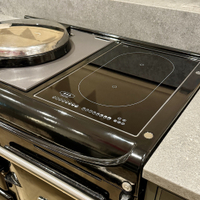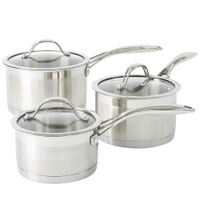‘What I wish I had known before buying an induction hob,’ reveals a kitchen design expert
Get the lowdown on the hottest kitchen innovation to date and discover if your next hob should be induction


Speedy, energy-efficient, and easy to clean, it is no wonder induction hob owners are borderline obsessed, including me. You may be reluctant to lose the use of any pots and pans that aren’t induction-compatible. But once you’ve experienced the giddy joys of cooking on induction, I promise you’ll be boxing them up for the local Charity Shop within the hour.
As an interiors journalist specialising in kitchen trends, I’ve witnessed induction’s rise to fame first-hand. From initial scepticism, especially from professional chefs who refused to believe anything could beat cooking on real flame, to a market that is now dominated by induction hobs. You’ll struggle to find a regular halogen electric hob anywhere besides the bargain bin, and gas hob sales are also flagging in a big way.
Even with years of kitchen appliance trends insight, not to mention most of the major manufacturers on speed dial, I still recall being fraught with indecision when choosing and buying an induction hob. I asked a LOT of questions and did a deep dive into the various options and benefits, to ensure the model I bought had all the features I’d need to feed my growing family. I was the very same when it came to researching what to know before buying a boiling water tap.
I bought my first induction hob a decade ago and haven’t looked back. I was upgrading from an extremely neurotic, possibly dangerous, gas hob at the time. It wouldn’t be an exaggeration to say the switch transformed my cooking enjoyment levels by 100%. Total game-changer.
I’ve bought two more induction hobs since (because I moved, not because they broke) and now consider myself something of an induction expert! Plug into my experiences to discover what you need to think about when considering how to pick the best induction stove and the best induction pans, including any reasons you may opt to steer clear.
What you need to know before buying an induction hob
For the induction uninitiated, it’s probably wise to start with a simple explanation of how induction cookers work, courtesy of John McLauchlan, head of Business Unit - Cooking, BSH Home Appliances. "Induction hobs operate using an electromagnetic process. When the base of the pan contains iron, it forms an electrical circuit with the hob. This circuit is agitated, which heats the base of the pan, cooking the food within," explains John.
There are also copper coils and electrical force fields involved. All you really need to know is that heat-up is incredibly fast, and the temperature can be adjusted in teeny, tiny increments, making the heat levels insanely easy to control. Even the best portable induction hobs, just on a smaller more flexible scale.
Sign up to our free daily email for the latest royal and entertainment news, interesting opinion, expert advice on styling and beauty trends, and no-nonsense guides to the health and wellness questions you want answered.
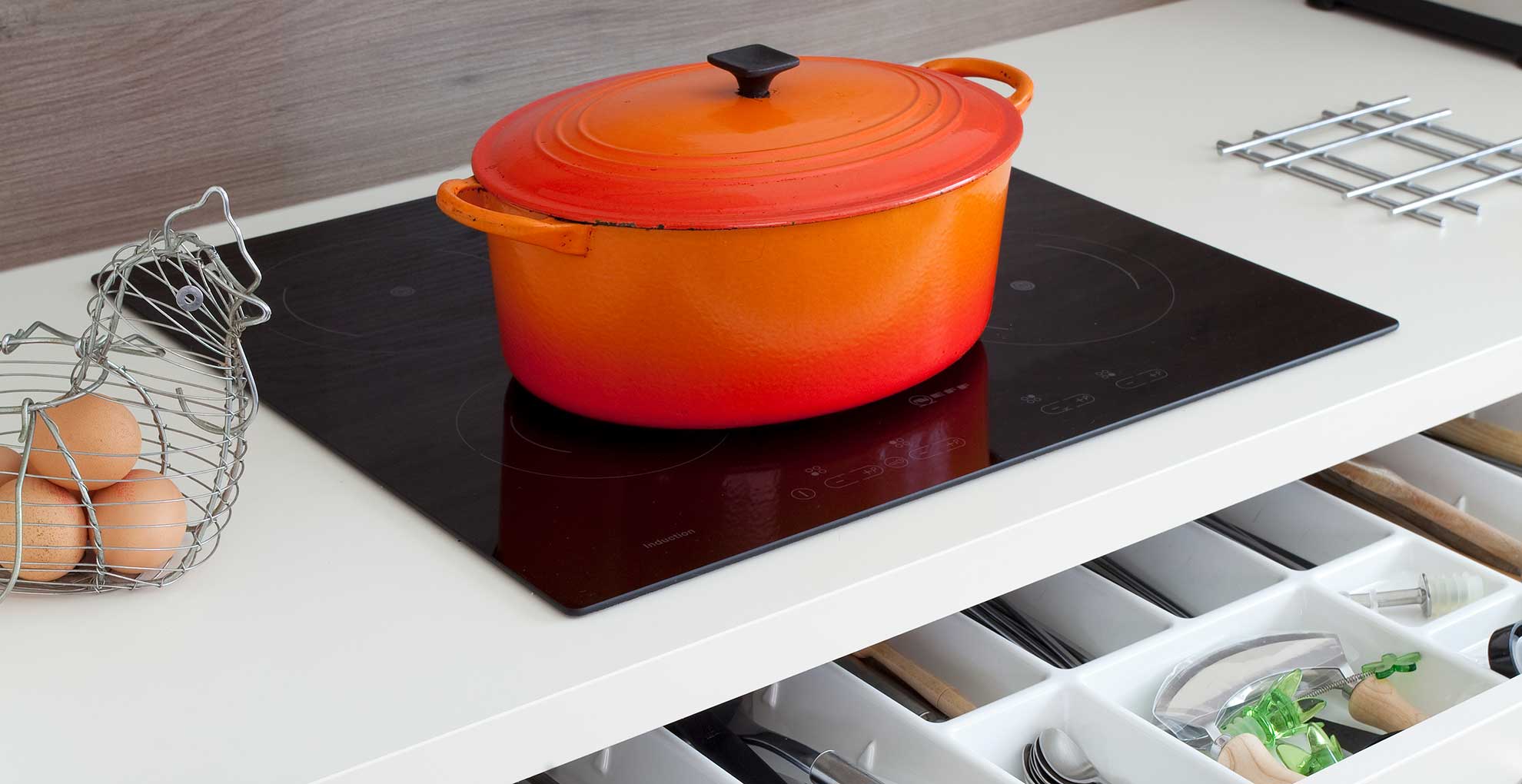
A more important consideration is how to find the best induction hob for you and your cooking style/needs. When first shopping, I really struggled to get my head round all the technical jargon and confusing features on offer from different models and brands. It didn’t help that different brands use different names for the exact same tech, or that induction tech is innovating and improving faster than the speed of light.
In the end, I found the best approach was to narrow down my options by size/shape, essential features, and installation preferences. Once I’d whittled down to two or three models, I then made my final decision based on price. Here are the key points I always consider.

John McLauchlan has extensive experience in the home appliance sector. With more than 20 years of industry experience, he possesses a deep knowledge of all BSH Group appliances, which are manufacturers of leading brands Neff, Bosch, Siemens, and Gaggenau.
SIZE OPTIONS
Just like gas or halogen, induction hobs tend to be classified size-wise according to width and the number of heating zones. Widths range from 30cm (aka a domino hob) to 90cm, but the most popular size is around 60-80cm wide. Deciding which size to go for will heavily depend on the space available in your kitchen. Bear in mind it’s nice to have at least 20cm-width of worktop on either side of your hob so you’re not penned into a corner, and there’s somewhere to rest raw ingredients, herbs and oils before you start cooking.
It's worth remembering that you can put a chopping board on top of an induction hob, avoiding the control panel, and use it as extra prep space, so don't worry too much about lost worktop space – handy for keeping counters clear in a small kitchen.
I found it easier to visualise what size I’d need by thinking about how many pans I tend to use at once. For our first induction hob, I went a bit OTT with a 90cm-wide six-zone model by De Dietrich. I loved it, but, in hindsight, it was unnecessarily big, especially given that the kitchen also had an AGA with two massive cast iron hotplates.
In reality, I rarely use more than three zones at once – one for a frying pan/wok, one for a stacked vegetable steamer and another for whatever carbs I’m cooking. I reined it in for subsequent purchases, going for a four-zone Whirlpool induction hob next and then my current two-zone induction hob, which sits next to a cast iron hotplate on my beloved ER3i AGA range cooker.
My induction hob is a two-zone model with bridge-zoning, timer, three low-level warming settings, Boost, auto cook and overheat protection by AGA.
KEY FEATURES
- Flexible zones: Sometimes called bridging zones, an induction with flexible zoning allows you to join two (or more) cooking zones together to create one, much larger cooking surface. When in bridging mode, one control panel operates the whole area. This smart feature allows you to accommodate bigger pans – I’ve got a 32cm diameter frying pan that I use with the flex-zone as it ensures the whole area is heated at once – and awkward-shaped pans, like a fish kettle for example. Combining zones often means you can get more pans on, I can squeeze three saucepans of varying sizes across two ‘bridged’ zones, for example. For total freedom, and maximum pan allowance, look for full-surface ‘zoneless’ induction hobs where the entire cooking surface is flexible, and you can put pans anywhere you like. These top-end models automatically recognise the size and position of each pan (usually a maximum of six at one time) and each pan can be controlled independently.
- Timers: Even the most basic induction hob should come with timers on one or all of the cooking zones. The best ones automatically turn off and revert to ‘keep warm’ once the time is up, which keeps food at the ideal serving temperature until you’re ready to serve up. "The timer function is a game-changer for me. Being able to perfectly cook pasta every single time just by selecting a duration is priceless," enthuses Cesar Fernandez, Lead Culinary Manager for Miele GB.
I also love the timer/keep warm function on my hob because it helps me to time manage when dishes need to go into the oven and means I can go off and do other chores without having to clock watch, safe in the knowledge that nothing will overcook or burn. I rarely cook anything without the timers to be honest (on the hob or in the oven).
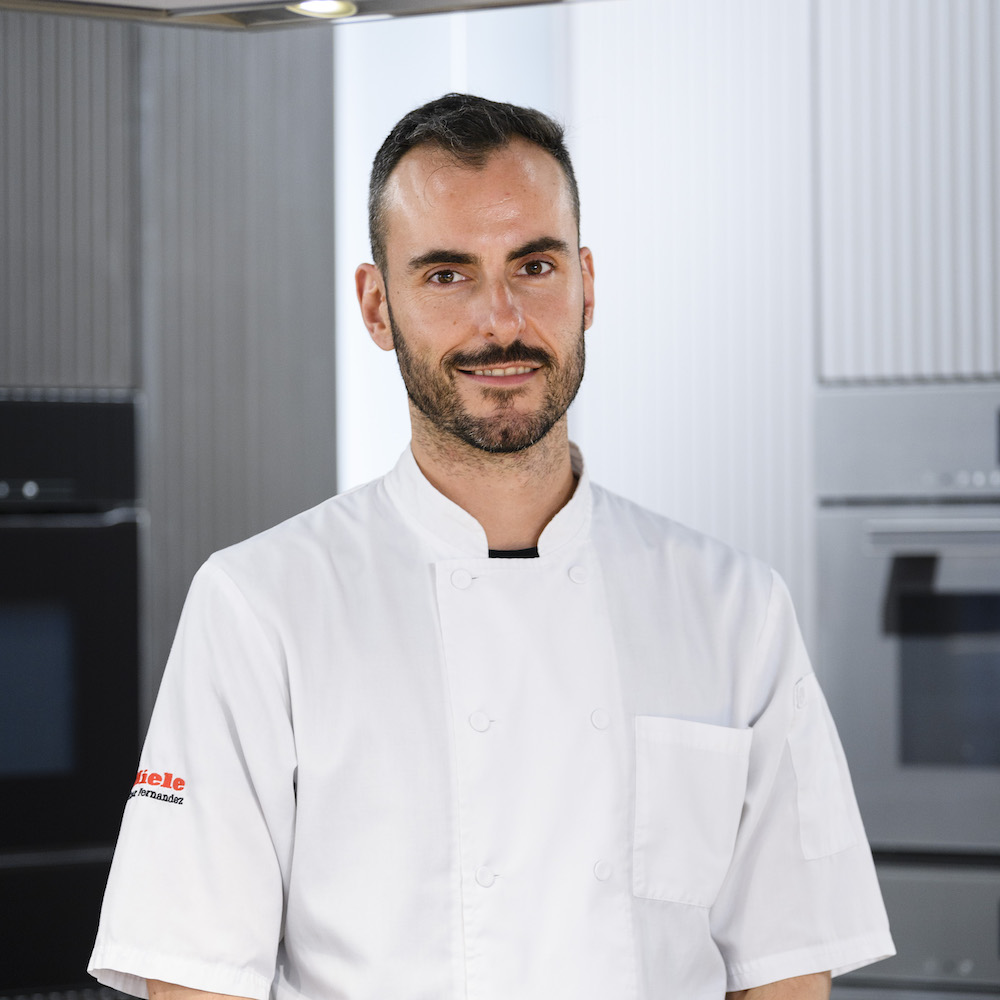
With a diploma from Leiths School of Food and Wine and a decade long career as a chef and culinary manager for Miele GB, Cesar Fernandez is passionate about cooking and food. He is an expert in his field and a trusted authority in the world of kitchen appliances.
- Power boost: Pretty much every induction hob comes with a power boost button, which delivers a higher dose of energy to get things moving (boiling) in super-quick time. On boost, I can bring a pan of rice to boiling point in less than 90 seconds. Before I got a boiling water tap, I used my induction hob to make hot drinks – so much quicker than an electric kettle. You shouldn’t stay in Boost mode for longer than necessary, or you’ll risk burning your food, but I start most pans off in Boost because I am always in a rush. It works by borrowing power from other zones, so you can’t usually Boost more than one pan at a time. Some models will automatically step out of Boost mode if it detects the pan is going to boil over or the hob is overheating.
- Precision control: For many more serious cooks, the beauty of induction lies in the exact control you have over the temperature levels. My induction hob has nine heat settings, plus Boost and Keep Warm, but some on the market have as many as 19 and a few include half-settings too. As well as going bonkers hot (up to 300 ºC in Boost), induction hobs can also go seriously low. ‘The ability to simulate bain-marie cooking without a water bath thanks to gentle heat control is another feature I love about induction,’ adds Miele’s Cesar Fernandez. If you’ve ever tried to melt chocolate on a gas or halogen hob, only for it to seize up and clump in front of your eyes, you’ll appreciate what Cesar is talking about.
- Pan detection: This feature automatically detects when a pan is removed from the hob and switches off the power to that zone. It’s not the most glamorous function but it does save a bit of time and brainpower when cooking, which is always appreciated. It will also turn the power off if you’ve used the wrong pan – helpful in the early days of use.
- Auto cook: Another handy button to have, auto cook starts a pan on Boost and then automatically reverts back to a pre-set power level. I use this a lot (with the timer function as well) when boiling pasta, rice and potatoes as it means I don’t have to hover about waiting for the water to boil before I can turn it down to simmering.
CONTROL OPTIONS
Most induction hobs come with touch controls, whereby you touch and hold the buttons to activate, or use a slider to slide your finger up and down the heat levels. The benefit of touch controls is the glass surface isn’t interrupted by protruding knobs, so it’s much easier to wipe clean. You do need to be careful not to place a pan over the controls as the hob will either turn off or, in the case of my first two models, sound a hideously loud alarm!
If you prefer the physicality of traditional knob style controls (some people just can’t get along with touch controls or have strength/mobility issues that limit use), opt for a magnetic knob that can be removed to make it cleaning easier.
Installation
Some induction hobs can be flush-mounted, which means the surface sits level with the worktop for a very sleek look. We chose flush mounting installation for our first induction hob – much to the disgust of our worktop fabricator who had to be millimetre precise when cutting out the hole! It cost more and did look good, but we were warned it would be virtually impossible to get out again.
The more common and easier installation method is to overmount, where the hob is just a little bigger than the hole and sits slightly proud of the worktop. If you opt for a frameless design with a bevelled edge, you’ll hardly notice the height difference and it will be easier to repair or replace the appliance should you ever need to.
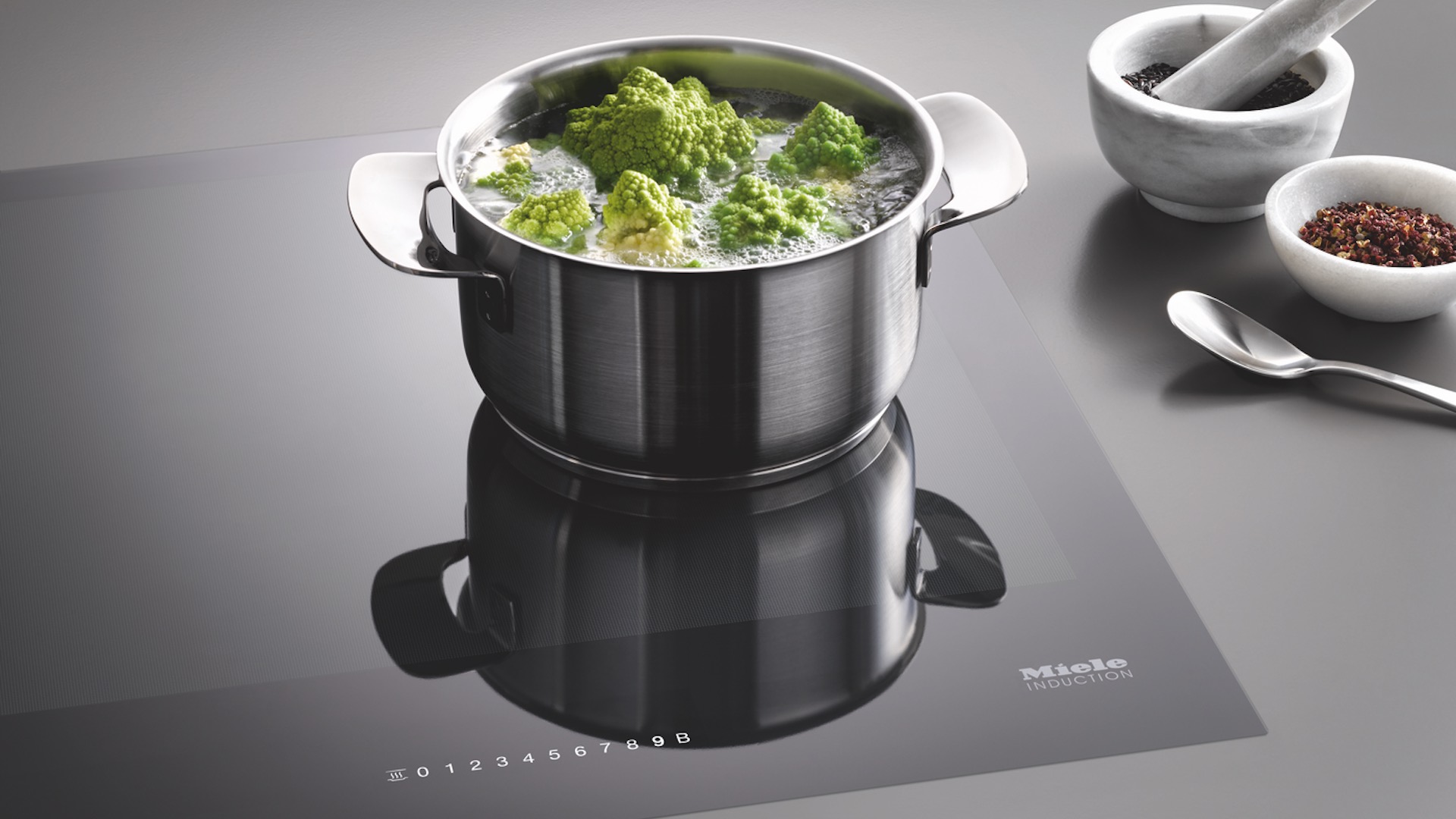
Energy use
If you care about the environment and/or your electricity bills, you should buy an induction hob based on energy efficiency alone. Whether you are comparing an induction hob versus an electric hob or an induction hob versus a gas hob, there’s really no contest when it comes to energy efficiency.
The figures vary according to who you ask, but induction is thought to offer around 85% efficiency, while halogen is around 70% and gas is a paltry 40% energy efficient. "This is primarily because induction hobs only heat the base of the pan and its contents, without heating the hob's glass or the surrounding air, so you’re not wasting energy heating anything you don’t need to," explains John McLauchlan from Neff.
COST
The price of induction hobs has come down dramatically since they were first introduced, and you can now buy a basic 60cm model for around £200. If you’re into the latest tech and want all the bells and whistles, be prepared to part with £3,000 plus.
The most expensive induction hobs include integral extraction, also known as venting hobs, and you can also expect to pay a lot more for a hob that automatically ‘speaks’ to the cooker hood above, operating in perfect unison.
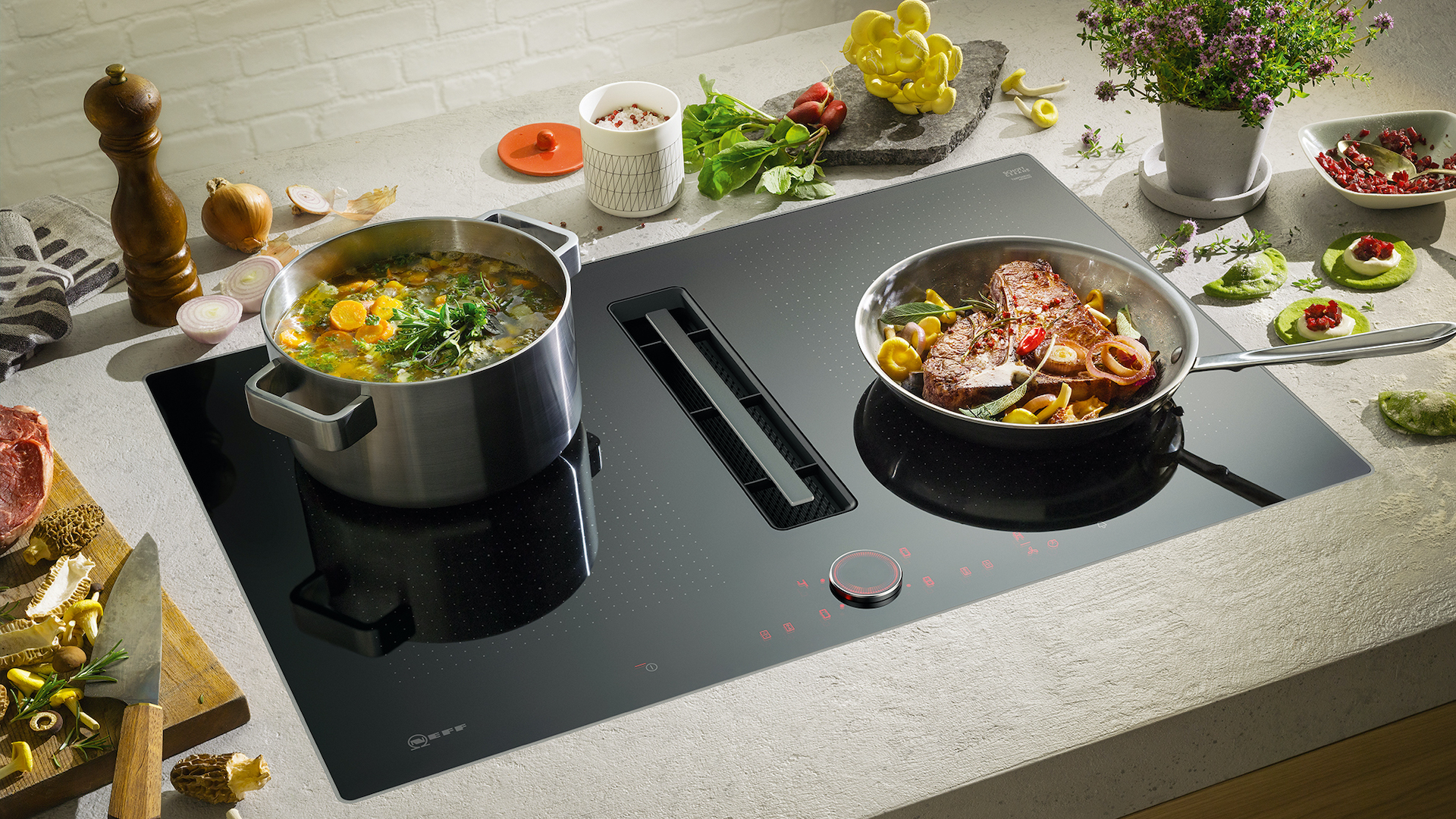
WHAT I WISH I HAD KNOWN BEFORE BUYING AN INDUCTION HOB?
Now we've ticked off the must-haves and sheer brilliance of induction cooking, it's time to reveal some of the less desirable features and fails so you can invest without any surprises. None of them has put me off this innovative tech, but these are a few things I wish I'd known before buying an induction hob.
1. THEY CAN GET HOT
Induction is absolutely the safest hob-top cooking option, and this is mainly because the electromagnetic force field only heats the pan, not the glass surface. At least that’s the theory. In reality, there will be residual heat and, if you are cooking for a long time – say simmering a casserole for several hours – that heat can be hot enough to cause significant burns.
Most induction hobs, including mine, come with residual heat indicators, which is a little red warning light that comes on next to the controls for the relevant zone. It’s a helpful feature but didn’t stop me from accidentally scorching my fingers when wiping away spills (before I learnt my lesson) and is unlikely to register with a child, so be warned.
2. THEY CAN BE TEMPERAMENTAL
Like most things with touch controls, induction hobs can be a bit glitchy. Or at least, all three of mine have been at one time or another. It’s nothing major, just the need to press buttons repeatedly before they’ll register or sometimes there will be a couple of droplets of water on the controls and the whole thing will shut down. Probably for good reason but it can be annoying.
I also get frustrated when I press the 'Boost button' on one zone and the other automatically cuts down to a low heat. I know it will happen, but it’s still annoying.
3. THEY SCRATCH EASILY
The ceramic glass on an induction hob is pretty tough and you’re unlikely to crack the glass but it will scratch, usually by some small particle stuck to the bottom of your frying pan. The first scratch is always the most upsetting!
"To minimise scratches, a clean base on all your pans is crucial. Unlike gas, induction doesn't require moving the pan around, which helps avoid scratches. Also, keeping the hob free from abrasive particles like salt or sugar before swirling your pan is essential," says Cesar Fernandez.
Knowing how to clean a glass-top stove properly also helps. to limit scratches.
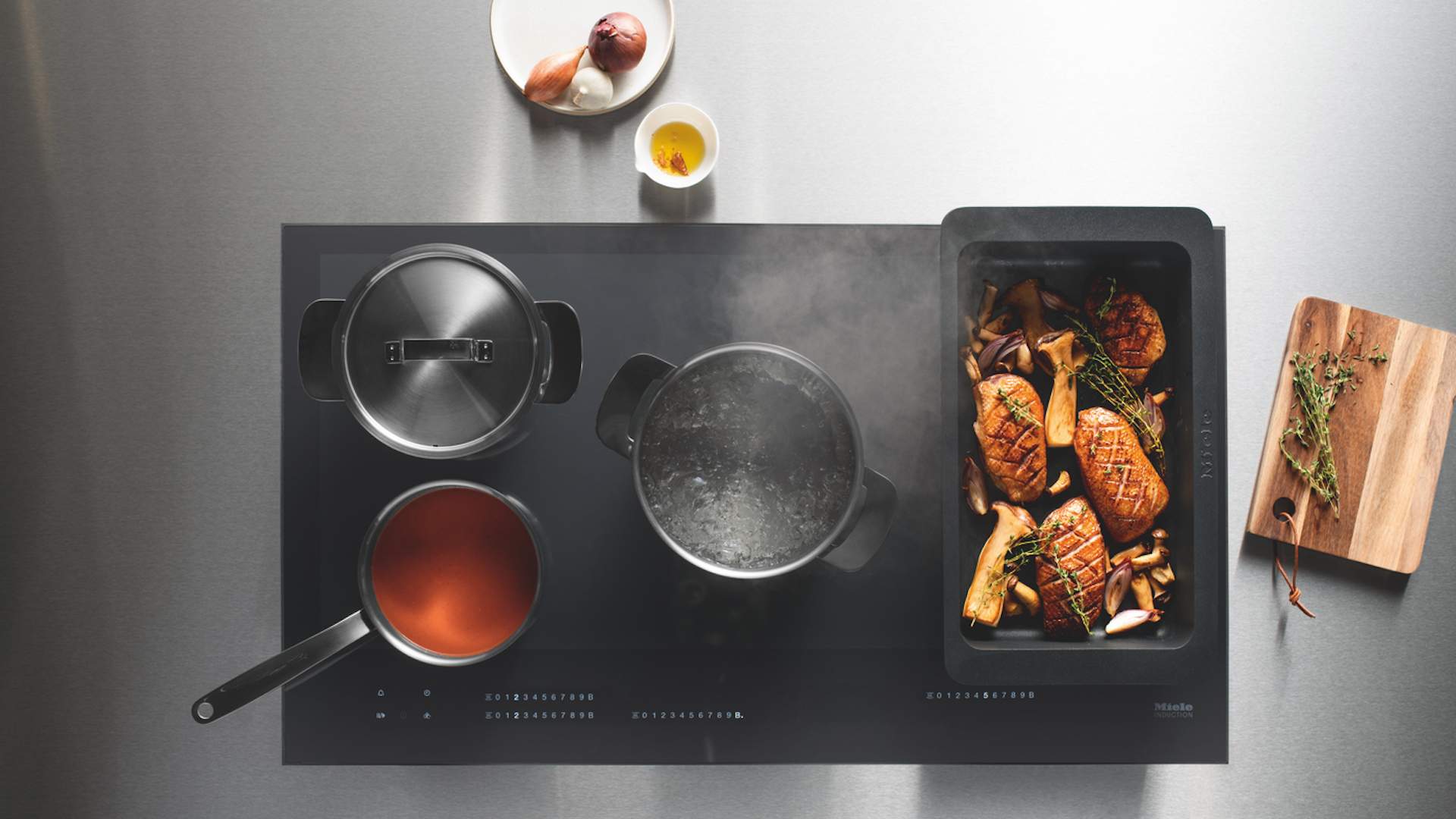
4. THEY CAN TAX YOUR BRAIN
I’ve had my current induction hob (on my ER3i AGA range cooker) since 2019 and I still don’t know how to stop the timers before they officially end. Or at least not without shutting the whole hob off (which is what I do). Yes, I’ve read the instructions, no I have not retained the information.
Bridging two zones can take a bit of mastering too, and I have friends with seriously fancy induction hobs who don’t use any of the features besides on/off and the temperature controls. They just don’t need technical challenges when trying to get dinner on the table ASAP at the end of another exhausting day. If this is you, go for a basic model and save some pennies.
5. THEY CAN RUIN NON-STICK PANS
Pan with non-stick coatings can only handle temperatures up to 260ºC and can be damaged by the higher temperatures induction hobs can produce. This is another lesson I learnt through bitter experience – using the Boost function to sear steaks in my new non-stick frying pan wrecked the coating on the first use. Sob.
I now use my best stainless-steel frying pan or cast iron griddle for any searing needs, which isn’t ideal because they are both a pain to clean. If you do want to use a non-stick pan with your induction hob, just stay well away from the power boost button.
It also helps to follow expert advice on how to clean stainless steel pans and how to clean a cast iron skillet or griddle to make life easier when you do have to use your alternative pans.
6. THEY CAN PROVE UNSUITABLE FOR CERTAIN HEALTH CONDITIONS
According to information supported by the British Heart Foundation, those with pacemakers should exercise caution while cooking on an induction hob. If in any doubt as to whether this could affect you it's always best to consult your medical team for their expert advice and guidance.
Is there a downside to induction hobs?
The only real negative to induction hobs is they don’t work with every type of pan every enthusiastic cook needs because of the material. In short, the base needs to be magnetic.
Most are clearly marked as ‘induction compatible’ on the packaging, but I’ve been known to take a fridge magnet out pan shopping so I can double-check. If the magnet sticks, you’re golden. If it slides off, put the pan back on the shelf and walk away.
Unless modified to make them induction-compatible, copper, aluminium and ceramic pans won’t work. Low-grade stainless-steel pans can also be a bit hit-and-miss, so do check carefully. I predominantly use Procook’s stainless steel pans and cast iron casserole pans.
This isn’t a problem if you’re in the market for new pans anyway but might be a sticking point if you’re extremely attached to your current induction incompatible collection, perhaps because they were a wedding gift or bequeathed to you by your favourite grandma. In which case, they’ll make lovely plant pots...
ProCook Stainless Steel Pans, set of 3, RRP £199 Now £109
These are the pans I use day in, day out in my kitchen that I find are the most compatible with my induction hob.
Professional advice and first-hand expertise are invaluable when buying an induction hob because unlike asking what you need to know when buying an air fryer or what to know when buying a dehumidifier an induction hob is more of an investment due to the higher price point.

An interiors journalist for more than 20 years, Linda Clayton has worked on a wide array of consumer titles, including Homes & Gardens, Livingetc, Country Homes & Interiors and Real Homes.
She graduated from Cardiff’s esteemed School of Journalism, Media and Cultural Studies with a First Class degree and Postgraduate Diploma in Magazine Journalism.
